Having died twice as the result of a freak accident that ultimately cost him the lower part of his right leg in 2009, you could forgive Richard Browne Jr for feeling like the world is against him.
But, when you meet the 24-year-old, you are presented with a fun-loving, engaging person that seems to have a constant smile on his face.
Once a promising American Football player, the amputation took Browne Jr down the route of sprinting, where he competes in the T44 class.
Silver medals were won at the 2012 Paralympics in London and at the IPC World Championships 12 months later, but that is not good enough as far as the determined American is concerned. Gold is the only colour on Browne Jr's mind and he has moved to Cambridge in East Anglia, where new coach Hayley Ginn is based, to realise his dreams.
Switching across the Atlantic has meant that the 60m and 200m world record holder has had to leave behind his young family, a subject which when raised is the only moment throughout this 30-minute interview that his eyes leave Sports Mole's gaze.
It is clear that the separation is hurting Browne Jr, but is also spurring him on as he prepares for the upcoming IPC World Championships in Doha and the 2016 Paralympics in Rio de Janeiro.
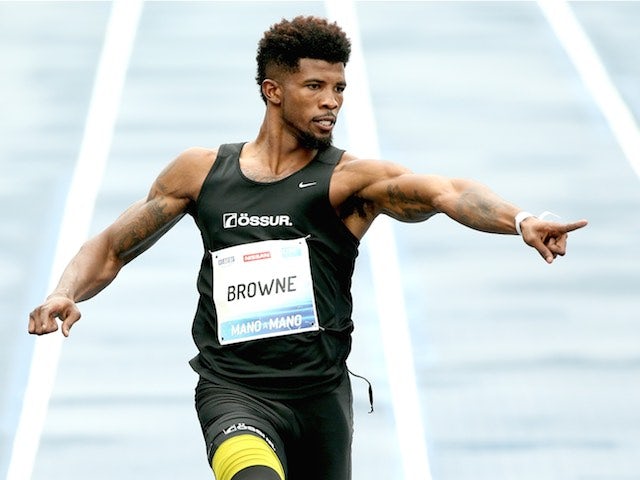
A lot of Paralympians were born with their disabilities, but that is not the case with you. How hard was it to adapt?
"It's difficult because you basically have to re-teach yourself to do everything. In a way, being born with a disability is a little bit easier in that sense because that's all you've ever known - you haven't had to re-train your brain and your nervous system. With me, it was about working out how to do all the basic little things. Now, we're at a point where my body is starting to catch up with my brain. It actually didn't take very long, but it's still an ongoing process."
On your website, you speak of the pain that you were in after the accident. In a way, was it a relief to have the leg amputated?
"If I knew then what I know now, I would have got my leg cut off immediately. It was one of those situations where you hear doctors say that they can do this and that. But every day it was just pain and then more pain. I don't even remember having two legs - all I remember is having one leg and a lot of pain. I remember getting my leg cut off, waking up the next day from surgery and thinking that feels good. Of course there was a little bit of pain from the stitches, but nothing in comparison to the previous three years. It was definitely relief."
Tell us a little bit about the accident. What actually happened?
"I went through a glass window. It was a rainy day in the US. I ran up on to the sidewalk, hit a wet patch and tripped up on some carpet. It was just a freaky accident. My leg went through a glass door and I'd cut my tibial artery, cut all my nerves and mangled up all the muscles. I had a couple of reconstructive surgeries and more on my nerves and muscles, but nothing seemed to work. It started off with a couple of little amputations before the main one."
How did you find sprinting?
"It really just fell into my lap. I went back to school and normal life. I didn't want to be anything special. Bret Lee, who made my prosthesis, asked me if I wanted to try sprinting and I thought - why not? I ended up competing at the Endeavor Games in Oklahoma, who are doing some great things. I did well, but it didn't hit me how good I could be until the following year when I got the chance to run at Crystal Palace."
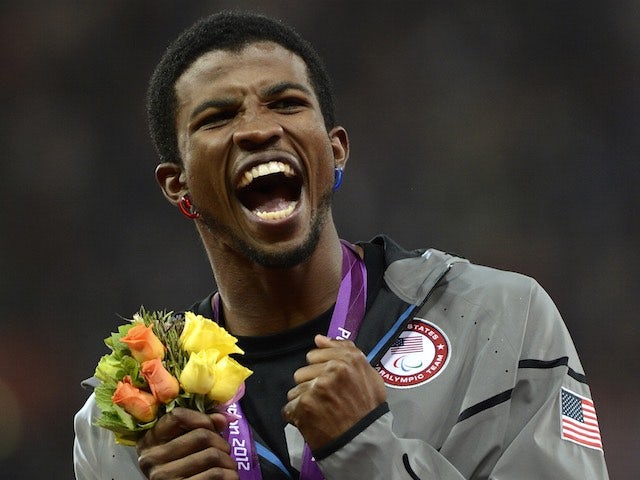 © Getty Images
© Getty Images
You've made a big decision to move to Cambridge to work with Hayley. What is about her that makes the switch so worthwhile?
"I have had great coaches, but it's always that disconnect when it comes to the blade itself. That's something that Hayley knew and she's been working with it for a few years now. She knows what she needs to visualise when it comes to the blade and that is something other coaches cannot give me. At this point in my career, I need those basic little small things that someone that is not educated in blades can see. I need to take the next step."
Does that mean that there is no equivalent to Hayley in the USA right now?
"There really is no equivalent to her in the world. We have amazing coaches back home, but there is always that disconnect. I don't feel like anyone is more knowledgeable than me when it comes to running with a blade. That's how I've been able to run the speeds that I run because I know how things work and I educate myself. It's been a learning curve because we're pushing boundaries that nobody thought could be pushed. Nobody thought that an amputee could run sub-11 seconds until 2008 when Marlon Shirley] did it - his record stood until Jonnie Peacock came along.
In Beijing [in 2008] 11.33s took gold in the 100m, now you wouldn't reach the final in that time. We're now in uncharted territory. We're writing the book because we don't have a book to go by. I'm going to benefit and run fast times, but it's the next generation of blade runners that are going to be way ahead of the curve because they're going to have me, [Jarryd Wallace] and Jonnie to look at.
Is it down to the likes of yourself to help establish that connection?
"I love running track, but I also love being able to educate kids on what they can do. When I was going through my rehab - swinging through the knee was the way to walk. That felt horrible. Just being able to walk like an able-bodied person is so hard. We're not in the 1970s or 1980s anymore, we have the technology which means we can do amazing things. There are surf-boarders and skate-boarders and all these other extreme sports, not just sprinting. Education is the biggest disconnect right now and that's a major part of what I want to do, both on and off the track."
You've been working with Hayley for around a month now - how has it been?
"It's been amazing. We've really worked some things out, especially with the blade. I was trying some things that really weren't working and she spotted them on the first day and we've been going from there. Looking at the broader scheme of things for Rio in 2016 and London in 2017, the sky is the limit for us."
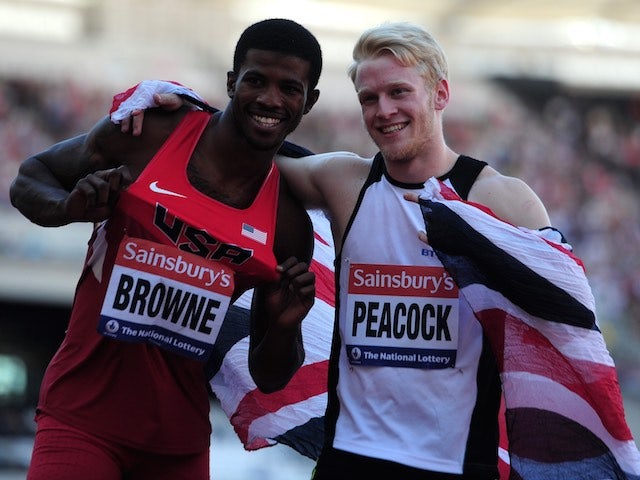 © Getty Images
© Getty Images
Your rivalry with Great Britain's Jonnie Peacock has been well documented. Does the fact that Hayley used to work with Jonnie add some extra spice to that rivalry?
"It's one of those things where great people cross paths. Jonnie is a great competitor and a great runner. He was the first to make people truly realise that we can run fast. He opened the door for the likes of me to come through. Our rivalry has been awesome for the sport and initially there was no-one else running sub-11, but now there's five guys that are doing it. With us up top leading the way, other people are catching up. It's actually becoming a sport and something that's marketable."
How have you found living in Cambridge?
"I love Cambridge. It's very quiet. I was a physics major in college, so I feel at home with the geeks! I definitely plan on sneaking into some classes. Stephen Hawking lives nearby supposedly so I'd love to see if he's doing a lecture. I want to expand my mind off the track as well as off it."
On the flip side, how hard is it to be away from your three young children? Does it affect you mentally?
"Being away from my kids absolutely sucks. It's very difficult because with the time difference, they are getting in from school and it's 10pm here and I've got to go to sleep to get ready for training. I'm constantly reminding myself that they are the reason I'm doing this. If you do the things that you need to do now, you can set them up for a better future. I grew up without anything. My mum worked two or three jobs just to make sure that we had the necessities and that's not something I want my kids to have to go through.
"I want to provide a better life and opportunities than daddy had. Daddy had to lose his leg to do that and I don't want them to ever have to go through that. They are my biggest inspiration. They are behind me wherever I am. If I'm having a bad day, I go to training and push that little bit harder. I want them to be not only be proud of me, but also be glad that I'm their dad."
Do you need to win gold in Doha to justify your decision to move to Cambridge and be away from your family?
"As far as the move goes, I will see that pay off in 2016. Even so, what we've fixed so far, anything less than gold would be a disappointment. I've been running 10.7s and 10.8s since 2014, so I'm making continual drops in my time. Going into Doha I'm confident. Jonnie won't be there, which is a little disheartening. But, the 100m and 200m will still be exciting and I'm coming out with the gold medals. I feel like the only person that can beat me is me."
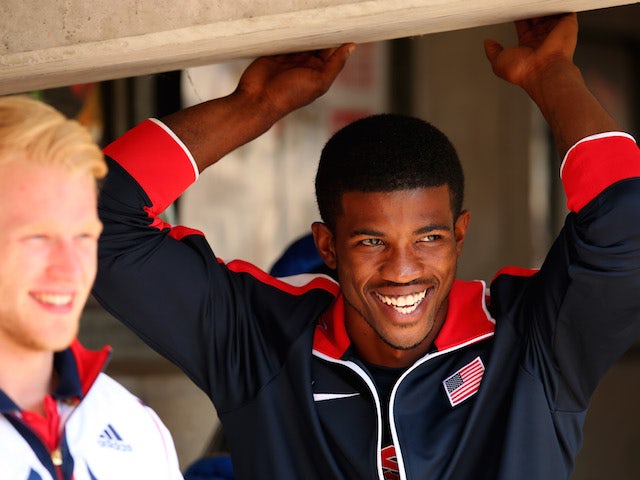 © Getty Images
© Getty Images
Your family drive you on, but what about the memories of the IPC World Championships in Lyon two years ago. You finished second in the 100m, is that still a big disappointment?
"Lyon is the chip on my shoulder. I've only lost one race since then and that was at Newcastle this year. Lyon is a very bad taste in my mouth. I was not supposed to lose that race. I basically gave Jonnie that gold medal in the last 10 metres - it haunts me. I was over confident. I put way too much pressure on myself. I got out of my comfort zone, but that's something I'm back to now. I'm very confident, but not to the point where I'm over stressed. I'm in control of what's happening. I don't care what is happening in the other seven lanes because I don't plan on seeing them too much! I don't even know where the silver medal is."
You hold the world record over 200m, so do you have your eye on the 100m record?
"I prefer the 200m. I'm a much better 200m runner than I am 100m. But, because of the 100m record and the two silver medals in back to back years when I know I could have won gold, it's an agitation. I really want to get that check mark off my career. The 100m is always my most stressful race."
You come across as a confident character, would that be fair? And is that something that comes naturally to you?
"I've always been this way. Ever since I was a kid, I wanted to have fun. I don't see the point in not having fun. Dying twice, which I did at the hospital, and knowing the fact that I might not have been here to have three beautiful children or that if the glass had been a little bit higher I would have lost my knee - it's those things I take full advantage of.
"When I'm out on the track or doing interviews, I'm being grateful. I'm showing my gratitude to the universe, to God or whoever you believe in up high. It could have been way worse. I travel the world, run in front of 60,000 people and I get paid for it - it's a pretty amazing life. Why would I be so down? I always say the brighter the lights, the brighter the show."
Your mannerisms - both on and off the track - have resulted in comparisons with Usain Bolt. How do you feel about that?
"I know Bolt. I met him a couple of years ago in Rio. I remember when I was first called the 'Usain Bolt of the Paralympics' after a race in Brussels. Since then I do play up to it because it's not a bad comparison to have! Seventeen Olympic and World medals, that's not bad at all! I do want to be my own person and own runner, though.
"Bolt is one of those guys who I have run into along the way that has shown what I can do and how to deal with success. He trains like no other. I took one of my gym regiments from him. I train with Justin Gatlin, who showed me how to come to work with a purpose. We have fun, but there's got to be a purpose. I train with the best, so now it's time to show up."
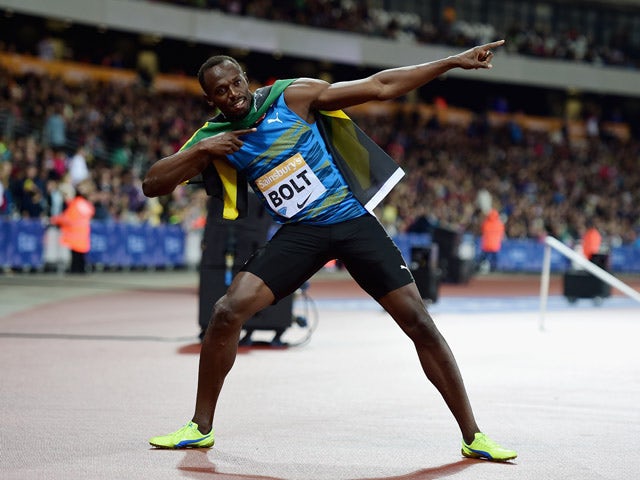 © Getty Images
© Getty Images
How do you prevent complacency from creeping in so that you don't suffer another repeat of Lyon?
"Coming into this year I had some complacency because I hadn't lost a race for so long. It was easy for me. But, Justin Gatlin pulled me to one side after training one day and said: 'When you're at the top, you've got to push yourself. It's you against you.' Now, I'm at the point where I'm testing myself and I'm putting an expectation on myself. I've got these goals in my head and now I'm chasing that, rather than chasing victory.
"It's a mental thing. It's hard because you have lots of interview, plenty of travelling, looking after kids and training. It's all of those wrapped into one, but you have to concentrate. I'm keeping my brain calm because you can get very complacent. It gets quiet up front and you can get trapped in your own thoughts. I'm always looking forward - nobody cares what you did yesterday. It's all about what you're doing today and what you're setting up for tomorrow."
Going back to Bolt, he is expected to retire after either the next Olympics or World Athletics Championships. You're still young of course, but do you have any plans in place when it comes to calling time on your career?
"I really want to get to Japan [in 2020]. I want three Games - Bolt did it. The best in my sport was Oscar Pistorius. He has nine World and Olympic medals and I only have three, so I've got a long way to go. I want to eclipse Oscar. Whatever he did off the track, I'm looking at him on the track. He admired me and I admired him. He was one of the first guys at the top to notice me. You've got to beat him to be the best in the sport. I'm one of those people that wants to be the best at what I do."
You seem to have a good knowledge of the sport. Was that the case before your accident, or is it something you've acquired since then?
"I knew nothing about it before. But, it's one of those sports that you have to know what you're doing. Some people turn up and just listen to their coach, but you can only go so far with that. When your brain is knowledgeable about the sport, as soon as your body catches up, you're going to be even better. Knowing something is worth just as much as being able to do it on the track. Oscar is the person study, so is Bolt, Asafa Powell, Gatlin and Carl Lewis. I was a nerd before I started running, so studying the sport has helped me along the way."
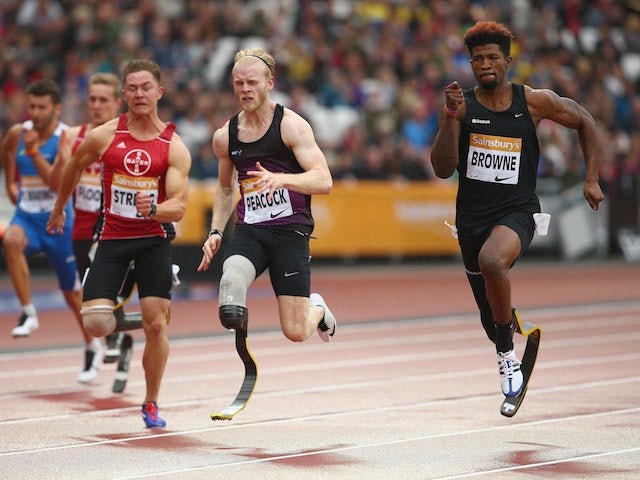 © Getty Images
© Getty Images
You're sitting here now with pink hair and it's been a variety of colours in recent years. Tell us about that.
"My hair is like a trademark. I've just dyed it pink to raise the awareness of breast cancer - my grandmother died of that disease in 2012 the day I came back from the Games. Gatlin called me 'Red Lightning' when it was red. It's my trademark now so I can't get rid of it!"
Is your grandmother an inspiration?
"My grandparents - all four of them - they are the biggest influences on my life. My grandad showed me how to be fun and loving and showed me what real music was, while my maternal grandad was more serious which is what you see from me on the track. He works hard at everything he does. My grandma was a big bulldog that was loving and would do anything for anyone.
"Jean, the one that I've dyed my hair for, was so sweet and no matter what she kept her smile on her face, even when I lost my leg. That rubbed off on me - you've got to keep positive. Training gets hard and it starts to hurt, but you've got to keep working hard and keep a smile on your face. I have them with me always."









